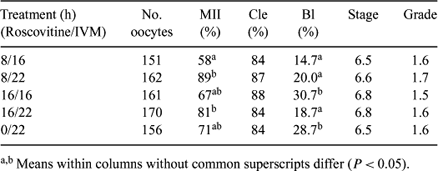241 EFFECT OF MEIOTIC ARREST BY ROSCOVITINE AND SUBSEQUENT IVM TIME ON DEVELOPMENTAL COMPETENCE OF IMMATURE BOVINE OOCYTES
L. Campos-Chillon A , T. Suh A , E. Carnevale A and G. SeidelAAnimal Reproduction and Biotechnology Laboratory, Colorado State University, Fort Collins, CO 80521, USA. Email: gseidel@colostate.edu
Reproduction, Fertility and Development 17(2) 271-271 https://doi.org/10.1071/RDv17n2Ab241
Submitted: 1 August 2004 Accepted: 1 October 2004 Published: 1 January 2005
Abstract
Maintaining immature bovine oocytes at the germinal vesicle stage by inhibiting M-phase promoting factor (MPF) activity is a reversible process when using roscovitine, and this can improve cytoplasmic maturation in vitro. However, optimum meiotic arrest times and subsequent IVM times have not been determined, so we evaluated the developmental competence of oocytes in relation to these times. Two by two factorial treatments consisting of 2 arrest times (8 h, 16 h) and 2 subsequent IVM times (16 h, 22 h) plus a control were replicated 6 times in this study. Semen from two bulls was used three times. Chemically defined media (CDM) were used throughout (Olson and Seidel 2000 J. Anim. Sci. 78, 152–157). Slaughterhouse-derived oocytes were arrested in meiosis in 1 mL of CDM-M without any hormones, but containing 50 μM roscovitine and 0.5% fatty acid-free (FAF)-BSA under 5% CO2 in air at 38.5°C. After 8 or 16 h of meiotic arrest, oocytes were washed and matured in 1 mL of CDM-M containing 0.5% FAF-BSA, 2 mM glucose, 50 ng/mL EGF, 15 ng/mL NIDDK-oFSH-20, 1 μg/mL USDA-LH-B-5, 1 μg/mL E2, and 0.1 mM cysteamine for 16 or 22 h under 5% CO2 in air at 38.5°C. Oocytes for the control group were matured in 1 mL of the CDM-M with hormones for 22 h. Ten oocytes from each group were fixed after IVM, stained with orcein, and evaluated for maturation to MII. For fertilization, motile sperm recovered from frozen-thawed semen were co-incubated for 18–20 h with ∼20 oocytes/group at a final sperm concentration of 0.5 × 106 sperm/mL in F-CDM. Presumptive zygotes were cultured in 0.5 mL of CDM-1 for 2.5 days and then in CDM-2 for 5.5 days in 5% CO2, 5% O2, 90% N2 in a humidified incubator at 39°C. Cleavage rates were evaluated after culture in CDM-1. Blastocyst rate, blastocyst stage (5 = early, 6 = full, 6.5 = expanding, 7 = expanded, 7.5 = hatching, 8 = hatched), and embryo quality (1 = excellent, 2 = good, 3 = fair, 4 = poor) were evaluated after CDM-2. Data were subjected to ANOVA; the arc sin transformation was used for percentage data, and least-squares means are presented. There were no significant differences in % cleavage (Cle), cell stage, or blastocyst quality among treatments (P > 0.1). However, meiotic arrest of oocytes for 16 h and subsequent IVM for 16 h improved embryo development to blastocysts compared to other roscovitine treatments (Table 1, P < 0.05). A bull effect for % blastocysts was observed, 19.9% and 25.2% for bulls 1 and 2, respectively (P < 0.08). Blastocyst production was improved by shortening oocyte maturation time from 22 to 16 h, when meiotic progression was previously inhibited for 16 h with roscovitine.

|


